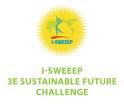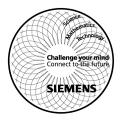Science & Research Competitions
Sometimes competitions are offered through business and industry. Often these are centered around science and research projects. Many allow individual students to apply, rather than teams. Applications often require PSAE or SAT scores and teacher recommendations for admission to the competition. The application process is detailed and needs to be done well in advance. Start planning for it now if you want to compete next year!
Some of these opportunities are listed below. Click on any logo to reach the sponsor webpage with more details.
|
The U. S. National BioGENEius Challenge The U. S. National BioGENEius Challenge is a competition in which the winners of both the At-Large and Local BioGENEius Challenge(s) compete and present their research posters and oral presentations in front of a panel of judges. The top ten (10) winners of the U.S. National BioGENEius Challenge will advance to the International BioGENEius Challenge held in Washington, DC on June 27, 2011, in conjunction with the BIO Annual International Convention. |
 |
|
|
Now in its 19th year, ExploraVision is a science competition that encourages K – 12 students to work in groups to simulate real research and development teams. Students can select any technology from something as basic as a water fountain to something as complex as nanotechnology. The team imagines and explores what that technology could be like 20 years from now and prepares an in-depth report that conveys its vision to others. It’s a hands-on, minds-on project that inspires students and fuels imagination. |
||
|
First Step to Nobel Prize in Physics First Step to Nobel Prize in Physics is an annual international competition in research projects in physics.All the secondary (high) school students regardless of the country, type of the school, sex, nationality etc. are eligible for the competition. The only conditions are that the school cannot be considered as a university college and the age of the participants should not exceed 20 years on March 31 (every year March 31 is the deadline for submitting the competition papers). There are no restrictions concerning the subject matter of the papers, their level, methods applied etc. All these are left to the participants’ choice. The papers, however, have to have a research character and deal with physics topics or topics directly related to physics. The project belongs to the out-of-school education. Participation in the competition does not need any agreement from the school or educational authorities. The pupils conduct their research in the way and conditions which are the most convenient to them. (not associated with any Nobel institution) |
||
|
Google is looking for the brightest, best young scientists from around the world to submit interesting, creative projects that are relevant to the world today. The competition is open to students aged 13 to 18 from around the world working on their own or in a team of two or three. For more details, visit the Science Fair Rules page. There will be 3 finalist winners, one in each age category 13-14, 15-16, 17-18. One of the 3 finalist winners will be selected as the Grand Prize winner. |
 |
|
|
Illinois Junior Academy of Science The aims and objectives of the Illinois Junior Academy of Science are numerous. Most important is the fact that the Illinois Junior Academy of Science has the interest of the science student at heart. It is an organization that exists solely for the benefit of students. It gives to students who will not necessarily become a science specialist some insight into the problems and methods of thinking that are particular to the scientist but applicable to other occupations, information concerning new investigations and discoveries in science, and an understanding of the science-produced equipment used. It encourages students with special ability and interest in science to go beyond the limits of the classroom in developing their own ideas and perhaps aiding them in their progress towards a career in science. |
||
|
Junior Science and Humanities Program Junior Science and Humanities Program (JSHS) invites high school students to submit a paper on an original research investigation in the sciences, engineering, or mathematics. By connecting talented students, their teachers, and research professionals at affiliated symposia and by rewarding research excellence, JSHS aims to widen the pool of trained talent prepared to conduct research and development vital to our nation. All students in grades 9-12 enrolled in public, private, or home schools in are eligible to participate. |
 |
|
|
Intel International Science and Engineering Fair Intel International Science and Engineering Fair (Intel ISEF), the world’s largest international pre-college science competition, provides an annual forum for more than 1,600 high school students from nearly 60 countries, regions, and territories to showcase their independent research. The Intel ISEF is the premier global science competition for students in grades 9-12. |
 |
|
|
Intel Science Talent Search (Intel STS) is the nation’s most prestigious science research competition for high school seniors. Since 1942, first in partnership with Westinghouse and beginning in 1998 with Intel, SSP has provided a national stage for the country’s best and brightest young scientists to present original research to nationally recognized professional scientists. |
 |
|
|
I-SWEEEP, the International Sustainable World (Energy, Engineering, and Environment) Project Olympiad, is a groundbreaking science fair open to high school students. The contest aims to create an educational platform for young researchers in which they present their innovative projects to take on today’s challenges in energy, engineering, and environment. I-SWEEEP will be open to ONLY high school students attending the grades in 9th thorough 12. Middle school students can participate in 3E Sustainable Future Challenge Contest that is newly launched by Cosmos Foundation. For more information, students can visit www.isweeep.org/3econtest |
 |
|
|
The Siemens Competition in Math, Science & Technology The Siemens Competition in Math, Science & Technology recognizes remarkable talent early on, fostering individual growth for high school students who are willing to challenge themselves through science research. Through this competition, students have an opportunity to achieve national recognition for science research projects that they complete in high school. It is administered by The College Board and funded by the Siemens Foundation.
|
 |
|
|
Young Epidemiology Scholars Competition Young Epidemiology Scholars (YES) Competition for original student research is designed to inspire talented students to investigate the many behavioral, biological, environmental, and social factors that affect health and, based upon this knowledge, to identify ways to improve the health of the public. The YES Competition awards up to 120 college scholarships each year to high school juniors and seniors who conduct outstanding research projects that apply epidemiological methods of analysis to a health-related issue. |
 |

